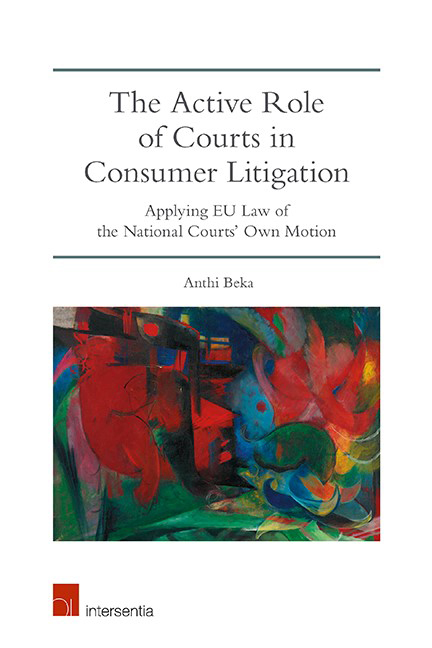Book contents
- Frontmatter
- Dedication
- Foreword by Professor Elise Poillot
- Introduction by Judge Etienne Rigal
- Acknowledgments
- Contents
- List of Cases
- List of Abbreviations
- Introduction
- PART I THE DOCTRINE OF THE ACTIVE CONSUMER COURT IN CONTEXT
- PART II THE EMERGENCE AND DISTINCTIVE FEATURES OF THE ACTIVE CONSUMER COURT DOCTRINE
- Chapter 4 The Establishment, Refinement and Consequences of Application of the Active Consumer Court Doctrine
- Chapter 5 The Impact of the Active Consumer Court Doctrine in Specific Proceedings
- Chapter 6 The Influence and Effectiveness of the Active Consumer Court Doctrine οn National Legal Systems
- Final Conclusions: Changing the Narrative and Moving Forward
- Bibliography
- Index
- About the Author
Chapter 5 - The Impact of the Active Consumer Court Doctrine in Specific Proceedings
from PART II - THE EMERGENCE AND DISTINCTIVE FEATURES OF THE ACTIVE CONSUMER COURT DOCTRINE
Published online by Cambridge University Press: 31 January 2019
- Frontmatter
- Dedication
- Foreword by Professor Elise Poillot
- Introduction by Judge Etienne Rigal
- Acknowledgments
- Contents
- List of Cases
- List of Abbreviations
- Introduction
- PART I THE DOCTRINE OF THE ACTIVE CONSUMER COURT IN CONTEXT
- PART II THE EMERGENCE AND DISTINCTIVE FEATURES OF THE ACTIVE CONSUMER COURT DOCTRINE
- Chapter 4 The Establishment, Refinement and Consequences of Application of the Active Consumer Court Doctrine
- Chapter 5 The Impact of the Active Consumer Court Doctrine in Specific Proceedings
- Chapter 6 The Influence and Effectiveness of the Active Consumer Court Doctrine οn National Legal Systems
- Final Conclusions: Changing the Narrative and Moving Forward
- Bibliography
- Index
- About the Author
Summary
The Opinion of AG Wahl in Unicaja Banco starts with the observation that:“ at the time of its inception, it is likely that most Member States would not have foreseen the impact that Directive 93/13/EEC was to have on their legal orders some 20 years later.” Indeed, when the Court decided the Océano Grupo case, the ex officio doctrine was in its infancy. But even then, the weaker party protection and the procedural imbalance line reasoning bore with it an enormous potential of reconceptualization of individual consumer litigation. As the references for preliminary ruling on the own motion assessment became more frequent, they would explore a new facet of the ex officio doctrine as a standard against which to measure the adequacy of national standards of effective procedural protection. Progressively the doctrine acquired a transprocedural character where the powers of the courts would have to be tested within specific procedural settings. This phase or evolution of the doctrine of the active consumer court can metaphorically be named the“ meta- Océano Grupo ” or the“ meta- ex officio ” era. This evolution is a specific procedural expression of a broader perspective of what Judge José Mar í a Fernández Seijo calls the“ transversal character” of consumer protection, which percolates a common standard of protection across the entire field of that legal discipline. In a broad sense, this idea may be reflected in Article 12 TFEU, according to which consumer protection has a transversal character expressed in the definition and implementation of other Union policies and activities.
Within the framework of the case law exploring the tranprocedural character of the active consumer court doctrine, the assessment of the compatibility of national procedural law with the principle of effectiveness of the exercise of consumer rights is carried out on the basis of the Van Schijndel balancing approach. Such an approach considers the role, progress and special features of the national procedural system, taking due account of its basic legal principles. In this assessment, the basic tenets of the active court doctrine as set out in the Océano Grupo judgment and its“ progeny” themselves become a benchmark of effectiveness and infuse national procedure.
- Type
- Chapter
- Information
- The Active Role of Courts in Consumer LitigationApplying EU Law of the National Courts’ Own Motion, pp. 239 - 312Publisher: IntersentiaPrint publication year: 2018



